She was just somebody who had to get out. (The Last War in Albion Book Two, Part 10: Burroughs)
Previously in The Last War in Albion: Among the commonly cited influences on Watchmen is Superfolks, a novel by Robert Mayer that shares several plot beats with it and other superhero stories Moore wrote in the 1980s. Moore has generally resisted this comparison, pointing to other texts that influenced him more.
This gestures towards a larger issue with treating Superfolks as a major antecedent to Watchmen, which is that very little of what Moore allegedly drew from it is actually all that innovative. Indeed, Pádraig Ó Méalóid, in a thorough analysis of Morrison’s claims, found that in almost every case either the similarities were overstated or an earlier antecedent could be found. (The sole exception was the use of Pxyzsyzgy, Mayer’s analogue for Mr. Mxyzptlk, as the ultimate villain behind everything, a plot point shared with the resolution of Whatever Happened to the Man of Tomorrow.) But in many ways it’s more helpful to take a step backwards and look at what both Superfolks and Moore’s work are attempting, and situating it in a larger context. Ultimately, both of them are engaging with superheroes in a manner familiar from the New Wave of science fiction spearheaded, in the UK, by J.G. Ballard and Michael Moorcock, and in the US by a broader group of writers including Harlan Ellison, Samuel Delaney, and Ursula K. Le Guin.
The defining aspect of the New Wave was a turn away from pulp adventure and a focus on plausible extrapolation of science and towards using the tropes of science fiction and fantasy to explore human experience, applying the approaches of literary modernism and postmodernism to the genres. One major approach to this, pioneered by Michael Moorcock, was to rework pulp genres into new forms, asking, in various ways, what the subjective experiences of a character in a pulp adventure story might be like. In many regards, it was inevitable that this would eventually be applied to superheroes; that it took until 1977 for the first one to be released is mainly down to the fact that the companies producing the overwhelming majority of superhero stories, Marvel and DC, were fundamentally conservative in their publishing. But with a concept as historically inevitable as this, a priority dispute is almost beside the point.
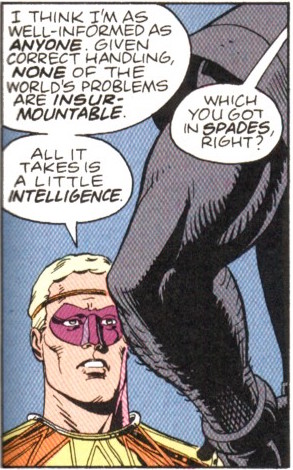 Indeed, what’s most revealing about the priority dispute is the degree to which Moore’s influences largely leapfrog Mayer and go back to the larger New Wave tradition. The central idea of Superfolks comes from the New Wave, but its scattershot approach of random pop culture namedropping is just the Mad Magazine sight gag approach translated to text. (Indeed, Superfolks, with its focus on a barely disguised Superman and Captain Marvel, owes no small debt to Kurtzman and Wood’s “Superduperman,” which Moore has always cited as the primary inspiration for Miracleman.) Without the tremendous success of Watchmen and Grant Morrison’s mischief making, it is difficult to believe that the book wouldn’t have remained eternally out of print. The main result of comparing Watchmen and Superfolks is the realization that it is not the plot of Watchmen that makes it extraordinary, but the fact that Watchmen handles those plot elements much more intelligently, and much more in the spirit of the New Wave.
Indeed, what’s most revealing about the priority dispute is the degree to which Moore’s influences largely leapfrog Mayer and go back to the larger New Wave tradition. The central idea of Superfolks comes from the New Wave, but its scattershot approach of random pop culture namedropping is just the Mad Magazine sight gag approach translated to text. (Indeed, Superfolks, with its focus on a barely disguised Superman and Captain Marvel, owes no small debt to Kurtzman and Wood’s “Superduperman,” which Moore has always cited as the primary inspiration for Miracleman.) Without the tremendous success of Watchmen and Grant Morrison’s mischief making, it is difficult to believe that the book wouldn’t have remained eternally out of print. The main result of comparing Watchmen and Superfolks is the realization that it is not the plot of Watchmen that makes it extraordinary, but the fact that Watchmen handles those plot elements much more intelligently, and much more in the spirit of the New Wave.
In this regard, it is worth noting one of the influences that Moore himself calls “one of my main influences” for Watchmen, and as the writer he’d pick “if I had to single out one major influence on my work,” namely William S. Burroughs – a writer who was also very much an intellectual touchstone for the New Wave. Unlike the works pejoratively cited as influences by Moore’s detractors, this is not an influence that occurs on the level of plot or characters. Watchmen does not hew to the plot of Naked Lunch, nor is there an obvious William Lee analogue running about within it. Instead the influence is largely conceptual. Its most obvious manifestation comes in the eleventh issue of Watchmen, which opens with a monologue from Ozymandias that begins “Multi-screen viewing is seemingly anticipated by Burroughs’ cut-up technique. He suggested re-arranging words and images to evade rational analysis, allowing subliminal hints of the future to leak through. An impending world of exotica, glimpsed only peripherally,” and ends by comparing this methodology to shamanistic traditions.
 |
|
Figure 877: Frequent Burroughs collaborator Brion Gysin. |
The cut-up technique, although associated with Burroughs, was not actually developed by him; he learned it in 1960 from the British artist Brion Gysin, who developed it independently, although others, including Burroughs, have identified earlier antecedents. The technique involves taking a physical page of text and cutting it into pieces, then rearranging the pieces to produce a new page in which fragments of the original are juxtaposed in new ways. As Burroughs put it in an interview, “any narrative passage or any passage, say, of poetic images is subject to any number of variations, all of which may be interesting and valid in their own right. A page of Rimbaud cut up and rearranged will give you quite new images. Rimbaud images – real Rimbaud images – but new ones.” The result leads to things like Gysin’s early cut-up poem “Minutes to Go,” which begins “the hallucinated have come to tell you that yr utilities / are being shut off dreams monitored thought directed / sex is shutting down everywhere you are being sent” and continues in much the same vein.
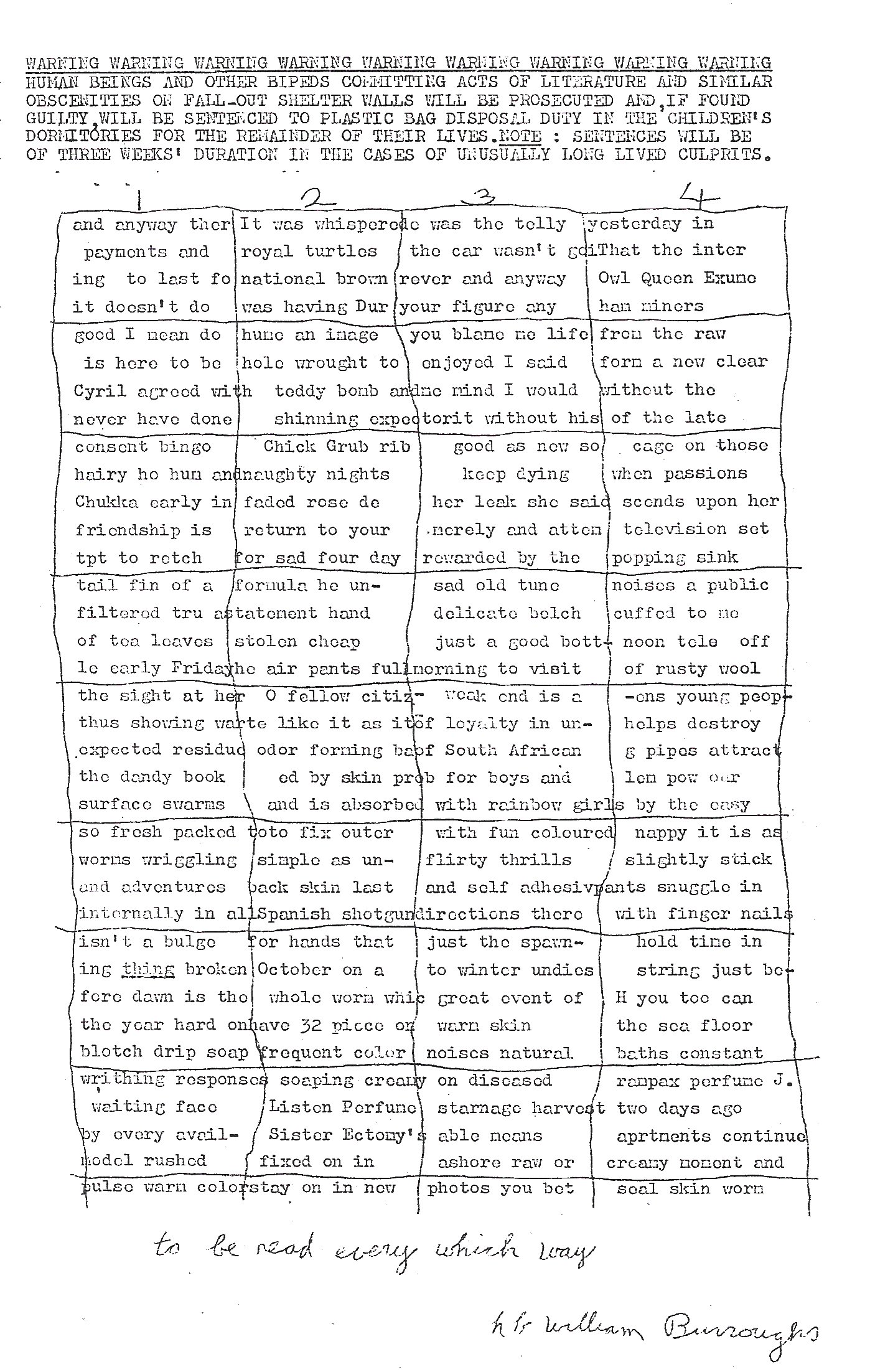 |
| Figure 878: A cut-up as created by Burroughs. |
Burroughs, however, elaborated on the technique, coming up with variations like the fold-in technique, in which a page is folded in half and juxtaposed with a half of a different page, creating a strange hybrid of the two. But his most famous experiments with the technique came when he applied it to tape recordings instead of text. As Burroughs describes it in “The Invisible Generation,” in typical style, “the simplest variety of cut up on tape can be carried out with one machine like this record any text rewind to the beginning now run forward an arbitrary interval stop the machine and record a short text wind forward stop record where you have recorded over the original text the words are wiped out and replaced with new words do this several times creating arbitrary juxtapositions you will notice that the arbitrary cuts are appropriate in many cases and your cut up tape makes surprising sense”. But the appeal of this approach to Burroughs goes far beyond the mere fact that new and surprising meaning is created. As he puts it later in the same essay, “listen to your present time tapes and you will begin to see who you are and what you are doing here mix yesterday in with today and hear tomorrow your future rising out of old recordings”, which is what Ozymandias is referring to when he talks of “subliminal hints of the future” that leak through the cut-up technique. But Burroughs is in practice more radical than this – the passage continues, “you are a programmed tape recorder set to record and play back
who programs you
who decides what tapes play back in present time”.
This cuts to the heart of how Burroughs influenced Moore and Watchmen; Moore is explicit that Burroughs’s influence on him was “not the cut-up stuff, but his thinking about the way that the word and the image are used to control.” This is a view Burroughs spelled out in another essay in which he espouses the cut-up method, entitled “The Electronic Revolution,” which opens with a discussion of the nature of language and the word that comes to the astonishingly provocative claim that “the written word was literally a virus that made spoken word possible.” This is a significant statement, not least because it tacitly echoes Aleister Crowley’s declaration that magic is a “disease of language,” a phrase Moore would later use as the title for a collection of Eddie Campbell’s comic adaptations of his spoken word pieces. And Burroughs’s ultimate conclusions from this premise are wholly consistent with these implications. Burroughs’s claim is not just that language is a virus, but that language is a well-evolved virus that does not destroy its host, but instead attains a sort of equilibrium whereby it cannot even be detected or recognized as an infection. As a result, the borders of the concept get blurred – language becomes inexorable from the vast system of “control machines” that constrain us, a system that was, for Burroughs, inseparable from his own heroin addiction.
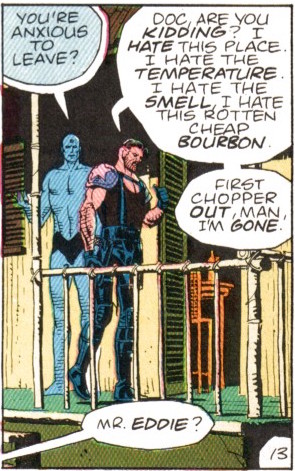 Nevertheless, Burroughs believed that by juxtaposing language from different contexts its tyrannical power could be turned against itself, allowing the artist to reshape the world. For instance, he suggests taking recordings of a politician’s speeches and “carefully editing in stammers mispronouncing inept phrases,” then taking a recording of the politician having sex, and then finally recording “hateful disapproving voices” before mixing them together and playing them, which he suggests would spell the end of the politician. But Burroughs goes much further than situations like this, in which there’s a presumptive audience for the eventual recording that might be affected by it. He also relates the story of his retaliation against a London cafe where he hated the service and the quality of the cheesecake, explaining how he recorded the sounds of the cafe and then visited the cafe again to play the recordings back, resulting in, as he tells it, the cafe going out of business. Later in the essay he suggests that the technique could be used to cause physical illnesses. Or, as Moore puts it, “Burroughs tends to see the word and the image as the basis for our inner, and thus outer realities. He suggests that the person who controls the word and the image controls reality.”
Nevertheless, Burroughs believed that by juxtaposing language from different contexts its tyrannical power could be turned against itself, allowing the artist to reshape the world. For instance, he suggests taking recordings of a politician’s speeches and “carefully editing in stammers mispronouncing inept phrases,” then taking a recording of the politician having sex, and then finally recording “hateful disapproving voices” before mixing them together and playing them, which he suggests would spell the end of the politician. But Burroughs goes much further than situations like this, in which there’s a presumptive audience for the eventual recording that might be affected by it. He also relates the story of his retaliation against a London cafe where he hated the service and the quality of the cheesecake, explaining how he recorded the sounds of the cafe and then visited the cafe again to play the recordings back, resulting in, as he tells it, the cafe going out of business. Later in the essay he suggests that the technique could be used to cause physical illnesses. Or, as Moore puts it, “Burroughs tends to see the word and the image as the basis for our inner, and thus outer realities. He suggests that the person who controls the word and the image controls reality.”
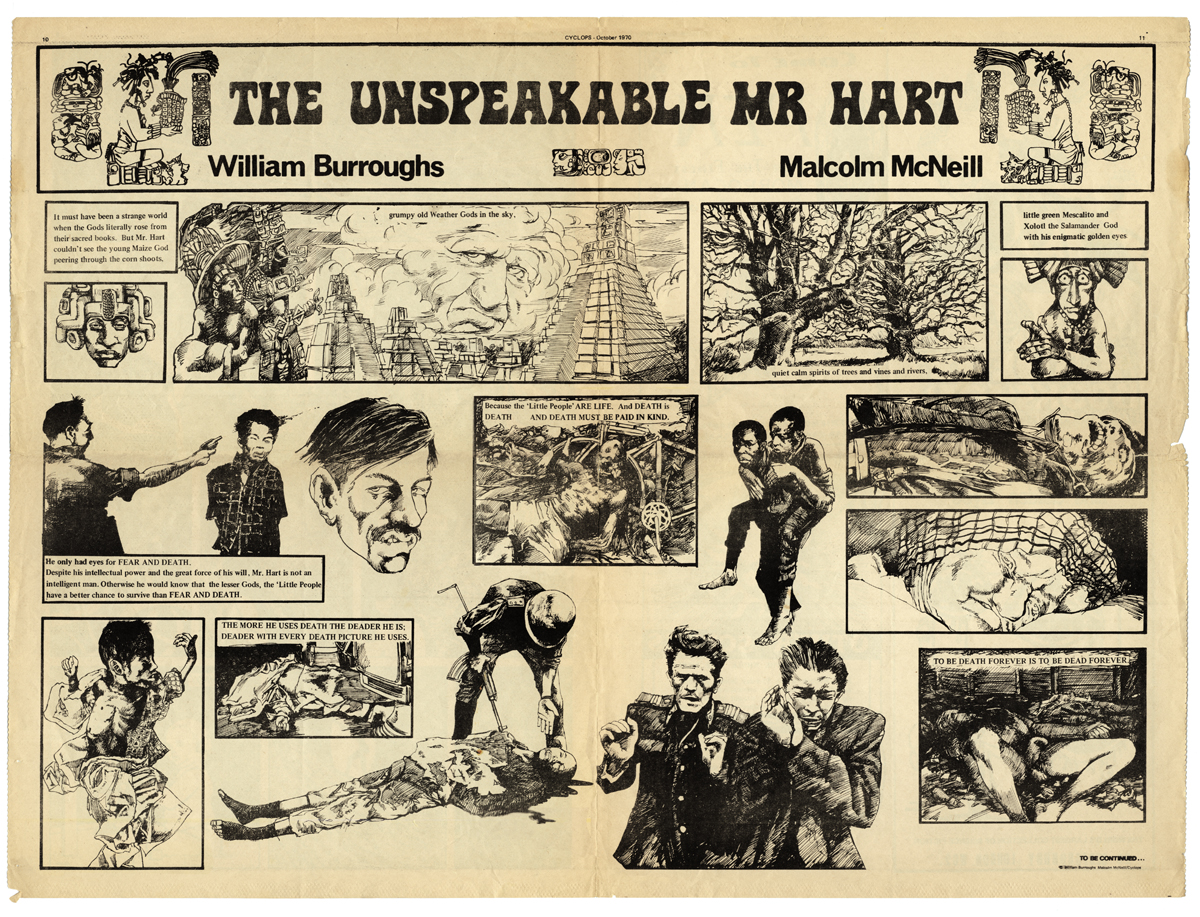 |
| Figure 879: An installment of Burroughs’s one attempt at a comic, The Unspeakable Mr. Hart. |
Moore’s interest in Burroughs, however, emerges from a peculiar implication of these viewpoints, specifically in how they apply to the medium of comics, which, as Moore points out, is a seemingly ideal medium for Burroughs given the way that juxtaposition is a basic part of its grammar. (Burroughs, for his part, never particularly focused on comics, aside from a short-run strip called The Unspeakable Mr. Hart, done with artist Malcolm MacNeill in a 1970 British underground magazine from the International Times crew, which the two continued as an illustrated book called Ah Pook Is Here. Interestingly, Burroughs and MacNeill never actually met while producing The Unspeakable Mr. Hart, and MacNeill found the project frustrating, as Burroughs’s scripts consisted of “half a page of copy… which didn’t read like comic book text at all.” They only met after the magazine broke down, when Burroughs proclaimed that “I want to meet the guy who knows how to draw me,” referring to MacNeill’s design for the eponymous Mr. Hart, which resembled Burroughs; in fact, MacNeill had never even seen a photograph of the man. This led to a lifelong friendship between the two collaborators. The Unspeakable Mr. Hart also served as a major influence in Dave Gibbons getting into comics. This sort of thing is par for the course with Burroughs.) As he explains, “with Watchmen I was trying to put some of his ideas into practice; the idea of repeated symbols that would become laden with meaning. You could almost play them like music. You’d have these things like musical themes that would occur throughout the work.” Although, of course, his repeated use of the overlaying of dialogue and images from different parts of the stories, itself a word/image version of Burroughs’s cut-up technique (and one anticipated by the proposed experiment that starts “The Invisible Generation,” where he proposes that the reader “turn off the sound track on your television set and substitute an arbitrary sound track prerecorded on your tape recorder street sounds music conversation recordings of other television programs you will find that the arbitrary sound track seems to be appropriate and is in fact determining your interpretation of the film track on screen people running for a bus in piccadilly with a sound track of machine-gun fire looks like 1917 petrograd”).
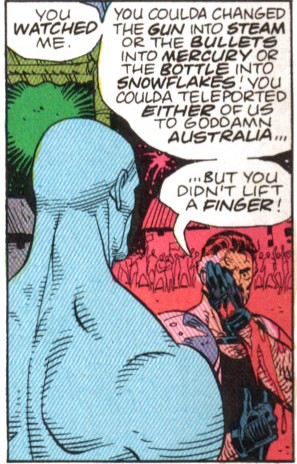 As theories of influence go, this has a major advantage over both the “Watchmen ripped off the Charlton characters” theory and the “Watchmen ripped off Superfolks” theory, namely that it actually offers some explanation of why and how Watchmen had the impact that it did. Any attempt to explain it in terms of a largely failed and forgotten line of 60s comics or a book that would have gone out of print forever if not for its tangental association with Watchmen is fundamentally inadequate: if the Charlton superhero comics and Superfolks were as important to Watchmen as some suggest, they’d also be, if not as important as Watchmen, at least comparable in stature. Burroughs, on the other hand, would suggest that it is not the ways in which the characters resemble other superheroes or the plot points that matter, except inasmuch as those characters and plot points serve as cut-up and spliced fragments to be manipulated, and that the engine that drives Watchmen’s success is, in practice, its structure and form, and the way in which those techniques are perfectly suited to magically reshaping the entirety of reality. [continued]
As theories of influence go, this has a major advantage over both the “Watchmen ripped off the Charlton characters” theory and the “Watchmen ripped off Superfolks” theory, namely that it actually offers some explanation of why and how Watchmen had the impact that it did. Any attempt to explain it in terms of a largely failed and forgotten line of 60s comics or a book that would have gone out of print forever if not for its tangental association with Watchmen is fundamentally inadequate: if the Charlton superhero comics and Superfolks were as important to Watchmen as some suggest, they’d also be, if not as important as Watchmen, at least comparable in stature. Burroughs, on the other hand, would suggest that it is not the ways in which the characters resemble other superheroes or the plot points that matter, except inasmuch as those characters and plot points serve as cut-up and spliced fragments to be manipulated, and that the engine that drives Watchmen’s success is, in practice, its structure and form, and the way in which those techniques are perfectly suited to magically reshaping the entirety of reality. [continued]

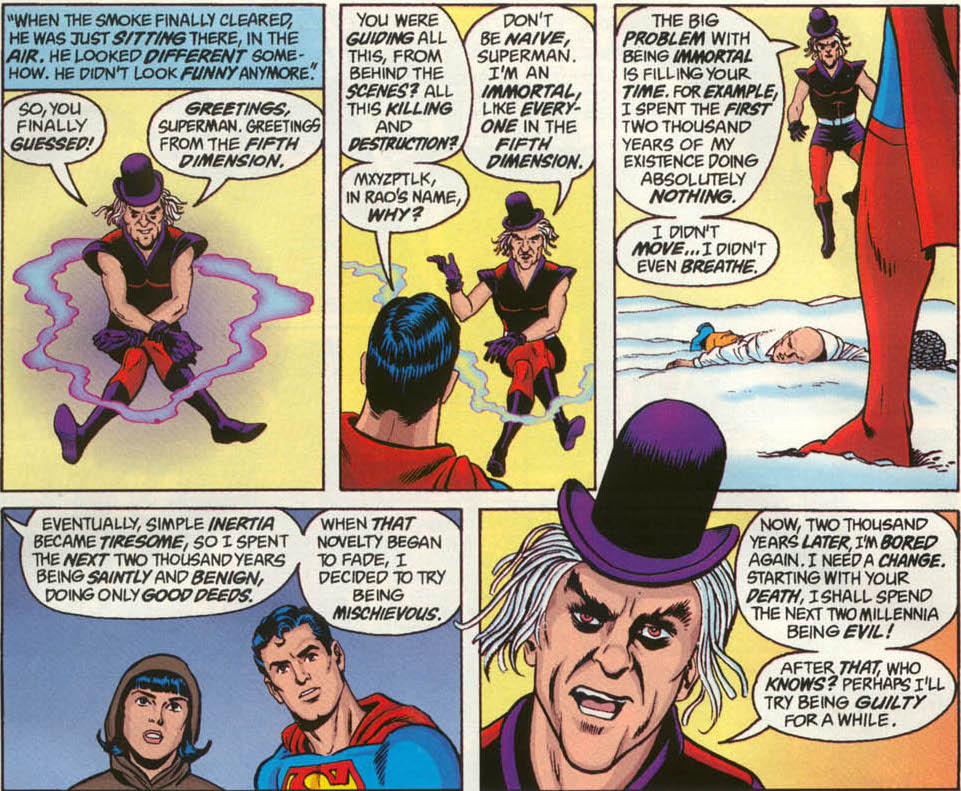

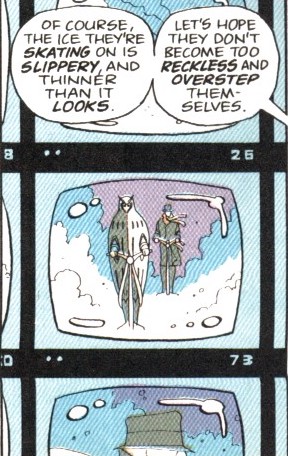
September 18, 2015 @ 9:09 am
Just noticed. We know from
http://www.philipsandifer.com/blog/guided-by-the-beauty-of-their-weapons-an-analysis-of-theodore-beale-and-his-supporters/#part4
that to be fascist means for a group to hold a narrative of a mythical golden age in the past when the group was united, pure and dominant; but that there was a ‘stab in the back’ by an ‘enemy within’, that led to defeat and, worse, the compromising of the purity of the group; and that these ‘enemies’ are now scapegoats, reviled and held responsible for everything that has gone wrong since; and that therefore the group must coalesce around one ‘great man’, the only one pure enough to recapture the animating spirit of the golden age, to purge the enemy within, and to lead the group back to its glory days.
Or in other words, the world’s newest fascist movement if the Labour party.
September 18, 2015 @ 9:16 am
Only if you empty the word ‘fascist’ of any actual content and then grossly misrepresent what’s going on inside the Labour Party.
September 18, 2015 @ 9:21 am
Gosh, you mean the linked article gives a really bad definition of fascism?
September 18, 2015 @ 10:02 am
I think the linked article could be qualified or added-to in some ways, but clearly you can’t take Phil’s definition of fascism’s formal traits and empty it of political/historical content.
September 18, 2015 @ 11:55 am
In the rewritten version for the book, I’m just going with Eco’s definition of fascism.
September 18, 2015 @ 11:53 am
Try to be vaguely on topic, SK.
September 19, 2015 @ 5:40 am
I thought he was. Right up to the end I assumed SK was talking about Rorschach and the Minutemen.
Labour = fascist? Would be laughable if not so easily disproved.
By their actions shall we judge them.
Also, I know you guys are working on it but the new Eruditorum press format is not very user friendly on my Kindle Fire.
September 19, 2015 @ 10:03 am
Far be it from me to go in to bat for SK, but I think you’re missing the point of the mischief here. The suggestion is not that the Labour Party is fascist, but that it fits Phil’s definition of fascism, showing that definition to be inadequate. The party’s non-fascist character is a basic assumption of the argument.
And as this blog’s most assiduous troll, SK was hardly going to hang around waiting for an opportunity to unleash that one on-topic.
September 19, 2015 @ 10:11 am
The trouble is that the Labour Party doesn’t fit Phil’s definition of fascism.
September 19, 2015 @ 11:00 am
Indeed, though I think the reasons why not (some of which have been mentioned by Josh04) are incidental rather than fundamental. Which is to say, I think it is perfectly feasible to imagine left-wing movements fitting that definition. None of its components are particularly alien to left-wing/radical politics, nor is the combination of them.
September 19, 2015 @ 7:19 pm
What’s the problem with it, exactly?
September 20, 2015 @ 3:23 pm
To clarify any ambiguity in the phrasing of my previous comment, I feel I should state that I was outlining the nature of SK’s argument, not endorsing it.
Still though, I admit that I probably wouldn’t have bothered if I didn’t think there was something resembling a valid point tucked away inside what SK said. While I think that what you presented was a perfectly sound description of fascism, I’m not convinced it amounts on its own to an effective definition. The idea of stripping out the specific content (natonalism, militarism, authoritarianism, romanticism, whatever) to leave a sort of mythic outline as the common denominator of different manifestations of fascism is an interesting one, but I think it led to something too loosely-drawn, too potentially applicable to tendencies that would not generally be considered fascist, to work in isolation. Laments for lost unity, purity and strength, narratives of betrayal by enemies within, purgative revivalism and personality cults are hardly unknown in left-wing politics, for starters. And I don’t see any particular reason why these things should not on occasion be found in combination in that sort of context. So I don’t think it can be sustained that where you find these things together, you will know that you are looking at fascism.
September 26, 2015 @ 7:47 pm
Also it means that Franco wasn’t a fascist. And while that’s a perfectly tenable position historically (he was allied with fascists, but was himself arguably a nationalist, rather than specifically a fascist dictator) it is perhaps not arguable at the same time as you’re trying to expand the definition of ‘fascist’ to include ‘anyone you disagree with’.
September 18, 2015 @ 12:44 pm
There’s quite a mangle to get that to work, anyway. Labour was never a party of any particular ‘purity’ that Blairites compromised. It was also never particularly united or dominant. The ‘golden age’ has to either refer to the last time Labour were winning elections, which was under Blair so that doesn’t work, or else go back to the pre-Blair Labour leadership when they couldn’t seem to win anything for love or money – a curious choice of golden age.
September 26, 2015 @ 7:44 pm
Labour’s golden age myth (remember, in the definition it’s important that it’s a myth, not reality) is one of the least controversial bits; Ken Loach made a whole film about it. http://www.imdb.com/title/tt2332801/
September 18, 2015 @ 12:46 pm
The font for the picture captions being the same as the main text is confusing (well, to those of us who are easily confused), although in a way that’s probably appropriate for a piece about cut-up literature.
September 18, 2015 @ 3:39 pm
I’ll see what I can do.
September 19, 2015 @ 11:05 am
Thanks, that’s easier on the eye.
September 18, 2015 @ 4:10 pm
Watchmen does not hew to the plot of Naked Lunch
Nothing could, really.
September 18, 2015 @ 5:37 pm
I really never get tired of writing sentences like that.
September 28, 2015 @ 4:13 am
Beautiful sentence.
September 22, 2015 @ 7:52 am
Just a quick note to point out your tagging seems inconsistent with the Last War material.
In order to read the last few articles it in the correct order I had to switch to the main blog.
September 28, 2015 @ 4:23 am
“Or, as Moore puts it, “Burroughs tends to see the word and the image as the basis for our inner, and thus outer realities. He suggests that the person who controls the word and the image controls reality.”
Great stuff in this post about Burroughs – one of my big favourites – and his cut-ups. This is why I come here, in fact I am almost seeing the whole of Last War as one massive time-spanning cut-up now, and perhaps seeing a further clue also how the Nintendo Project will destroy Gamergate.
The above quote with reference to Watchmen makes me think of my experience as a trained designer, as throughout the book one of the features that struck me (and still does) is the use of advertising and logos. I would interpret this as a perfect comment on the attempts by corporations and advertisers attempting to do the above. In a lot of ways this idea is even more relevant now as many of us carry around and use logo-based devices that apparently “give us control and freedom” over text, image and our lives, but the joke’s on us.